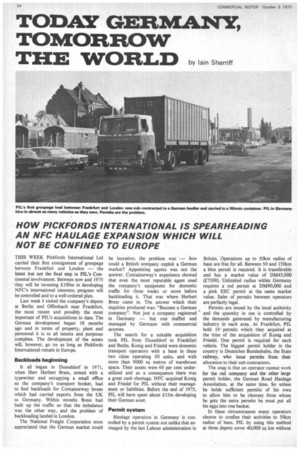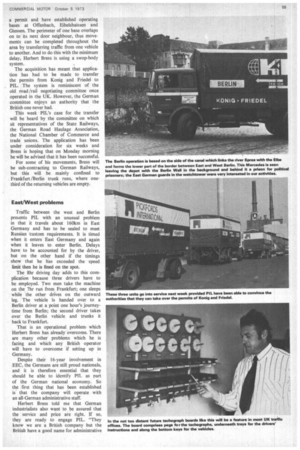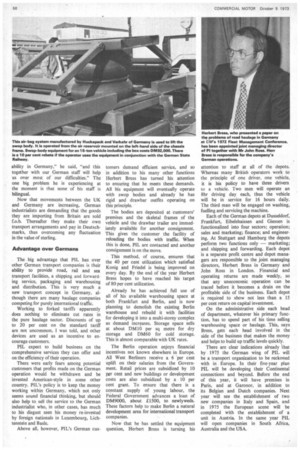TODAY GERMANY, TOMORROW
Page 56

Page 57

Page 58

If you've noticed an error in this article please click here to report it so we can fix it.
THE WORLD bylaInshemff
HOW PICKFORDS INTERNATIONAL IS SPEARHEADING AN NFC HAULAGE EXPANSION WHICH WILL NOT BE CONFINED TO EUROPE
THIS WEEK Pickfords International Ltd carried their first consignment of groupage between Frankfurt and London — the latest but not the final step in PIL's Continental involvement. Between now and 1975 they will be investing £100m in developing NFC's international interests; progress will be controlled and to a well-ordered plan.
Last week I visited the company's depots at Berlin and Offenbach near Frankfurt, the most recent and possibly the most important of PIL's acquisitions to date. The German development began 18 months ago and in terms of property, plant and personnel it is to all intents and purposes complete. The development of the assets will, however, go on as long as Pickfords International remain in Europe.
Backloads beginning It all began in Dusseldorf in 1971, when Herr Herbert Bress, armed with a typewriter and occupying a small office as the company's transport broker, had to find backloads for Containerway boxes which had carried exports from the UK to Germany. Within months Bress had built up the traffic so that the imbalance was the other way, and the problem of backloading landed in London.
The National Freight Corporation soon appreciated that the German market could
be lucrative; the problem was — how could a British company exploit a German market? Appointing agents was not the answer. Containerway's experience showed that even the most reputable agent used the company's equipment for domestic traffic for three weeks or more before backloading it. That was where Herbert Bress came in. The answer which their inquiries produced was: "Become a German company". Not just a company registered in Germany — but one staffed and managed by Germans with commercial acumen.
The search for a suitable acquisition took PIL from Dusseldorf to Frankfurt and Berlin. Konig and Friedel were domestic transport operators with a base in these two cities operating 50 units, and with more than 9000 sq metres of warehouse space. Their assets were 60 per cent underutilized and as a consequence there was a great cash shortage. NFC acquired Konig and Friedel for PIL without their management or liabilities. Before the end of 1975, PIL will have spent about £15m developing their German asset.
Permit system Haulage operation in Germany is controlled by a permit system not unlike that envisaged by the last Labour administration in Britain. Operations up to 50km radius of base are free for all. Between 50 and 150km a blue permit is required. It is transferable and has a market value of DM45,000 (£7500). Unlimited radius within Germany requires a red permit at DM90,000 and a pink EEC permit at the same market value. Sales of permits between operators are perfectly legal.
Permits are issued by the local authority and the quantity in use is controlled by the demands generated by manufacturing industry in each area. At Frankfurt, PIL hold 19 permits which they acquired at the time of the acquisition of Konig and Friedel. One permit is required for each vehicle. The biggest permit holder in the country is Deutsches Bundesbahn, the State railway, who issue permits from their allocation to their sub-contractors.
The snag is that an operator cannot work for the rail company and the other large permit holder, the German Road Haulage Association, at the same time. So unless he holds sufficient permits of his own to allow him to be choosey from whom he gets the extra permits he must put all his eggs into one basket.
In these circumstances many operators choose to confine their activities to 50km radius of base. PIL by using this method at three depots cover 40,000 sq km without
a permit and have established operating bases at Offenbach, Eibelshaissen and Giessen. The perimeter of one base overlaps on to its next door neighbour, thus movements can be completed throughout the area by transferring traffic from one vehicle to another. And to do this with the minimum delay, Herbert Bress is using a swop-body system.
The acquisition has meant that application has had to be made to transfer the permits from Konig and Friedel to PIL. The system is reminiscent of the old road /rail negotiating committee once operated in the UK. However, the German committee enjoys an authority that the British one never had.
This week PIL's case for the transfer will be heard by the committee on which sit representatives of the State Railways, the German Road Haulage Association, the National Chamber of Commerce and trade unions. The application has been under consideration for six weeks and Bress is hoping that on Monday morning he will be advised that it has been successful. For some of his movements, Bress will be sub-contracting to German Railways, but this will be mainly confined to Frankfurt /Berlin trunk runs, where onethird of the returning vehicles are empty.
East/West problems
Traffic between the west and Berlin presents PIL with an unusual problem in that it travels about 160km in East Germany and has to be sealed to meet Russian 'custom requirements. It is timed when it enters East Germany and again when it leaves to enter Berlin. Delays have to be accounted for by the driver, but on the other hand if the timings show that he has exceeded the speed limit then he is fined on the spot.
The 8hr driving day adds to this complication because three drivers have to be employed. Two men take the machine on the 7hr run from Frankfurt; one sleeps while the other drives on the outward leg. The vehicle is handed over to a Berlin driver at a point one hour's journeytime from Berlin; the second driver takes over the Berlin vehicle and trunks it back to Frankfurt.
That is an operational problem. which Herbert Bress has already overcome. There are many other problems which he is facing and which any British operator will have to overcome if setting up in Germany.
Despite their 16-year involvement in EEC, the Germans are still proud nationals, and it is therefore essential that they should be able to identify PIL as part of the German national economy. So the first thing that has been established is that the company will operate with an all-German administrative staff.
Herbert Bress told me that German industrialists also want to be assured that the service and price are right. If so, they are ready to engage PIL. "They know we are a British company -but the British have a good name for administrative
ability in Germany," he said, "and this together with our German staff will help us over most of our difficulties." The one big problem he is experiencing at the moment is that none of his staff is bilingual.
Now that movements between the UK and Germany are increasing, German industrialists are demanding that the goods they are importing from Britain are sold f.o.b. Thereafter they make their own transport arrangements and pay in Deutschmarks, thus overcoming any fluctuation in the value of sterling.
Advantage over Germans The big advantage that PIL has over other German transport companies is their ability to provide road, rail and sea transport facilities, a shipping and forwarding service, packaging and warehousing and distribution. This is very much a new transport concept in Germany, although there are many haulage companies competing for purely international traffic.
Working to forked tariffs apparently does nothing to eliminate cut rates in the pure haulage sector. Discounts of up to 20 per cent on the standard tariff are not uncommon, I was told, and other devices are used as an incentive to encourage customers.
PIL expect to build business on the comprehensive services they can offer and on the efficiency of their operation.
There were early fears among potential customers that profits made on the German operation would be withdrawn and be invested American-style in some other country. P1L's policy is to keep the money working within Germany, which not only seems sound financial thinking, but should also help to. sell the service to the German industrialist who, in other cases, has much to his disgust seen his money re-invested by foreign nationals in Luxembourg, Lichtenstein and Basle.
Above all, however, PIL's German cus
tomers demand efficient service, and so in addition to his many other functions Herbert Bress has turned his attention to ensuring that he meets these demands. All his equipment will eventually operate with swop bodies and already he has rigid and drawbar outfits operating on this principle.
The bodies are deposited at customers' premises and the skeletal frames of the vehicle and the drawbar trailer are immediately available for another consignment. This gives the customer the facility of reloading the bodies with traffic. When this is done, PIL are contacted and another consignment is on the move.
This method, of course, ensures that the 40 per cent utilization which satisfied Konig and Friedel is being improved on every day. By the end of the year Herbert Bress hopes to have reached his target of' 80 per cent utilization.
Already he has achieved full use of all of his available warehousing space at both Frankfurt and Berlin, and is now planning to demolish the existing Berlin warehouse and rebuild it with facilities for developing it into a multi-storey complex as demand increases. Storage space sells at about DMIO per sq metre for dry storage and DM60 for cold storage. This is almost comparable with UK rates.
The Berlin operation enjoys financial incentives not known elsewhere in Europe. All West Berliners receive a 6 per cent uplift on their salaries from the Government. Retail prices are subsidized by 10 per cent and new buildings or development costs are also subsidized by a 10 per cent grant. To ensure that there is a constant supply of young labour, the Federal Government advances a loan of DM9000, about £1500, to newlyweds. These factors help to make Berlin a natural development area for international transport companies.
Now that he has settled the equipment question, Herbert Bress is turning his attention to staff at all of the depots. Whereas many British operators work to the principle of one driver, one vehicle, it is his policy to have three drivers to a vehicle. Two men will operate an 8hr driving day each, thus the vehicle will be in service for 16 hours daily. The third man will be engaged on washing, fuelling and servicing the machine.
Each of the German depots at Dusseldorf, Frankfurt, Eibelshaissen and Giessen is functionalizeci into four sectors; operation; sales and marketing; finance; and engineering. At Stuttgart and Hamburg the depots perform two functions only — marketing; and shipping and forwarding. Each depot is a separate profit centre and depot managers are responsible to the joint managing directors, Herbert Bress in Germany and John Ross in London. Financial and operating returns are made weekly, so that any uneconomic operation can be traced before it becomes a drain on the profitable side of the business. Each depot is required to show not less than a 15 per cent return on capital investment.
On the administrative side each head of department, whatever his primary function, has to spend part of his time selling warehousing space or haulage. This, says Bress, gets each head involved in the side of the business that makes the money and helps to build up traffic levels quickly.
There are clear indications already 'that by 1975 the German wing of PIL will be a transport organization to be reckoned with in Europe. In their five-year plan PIL will be developing their Continental connections and beyond. Before the end of this year, it will have premises in Paris, and at Garonor, in addition to its Belgian and Dutch companies. Next year will see the establishment of two new companies in Italy and Spain, and in 1975 the European scene will be completed with the establishment of a unit in Austria. In the same year PIL will open companies in South Africa, Australia and the USA.
















































































































































